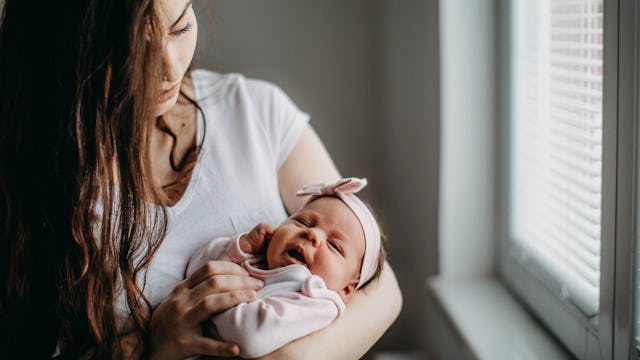What I Wish Someone Had Told Me About Postpartum Anxiety

Being pregnant was great. Books, websites, and forums existed for any and every topic I could imagine. They detailed every step of the process so the mom-to-be felt prepared for everything. As a person with anxiety, I found comfort in the millions of pages of scientific facts and parental advice.
What I discovered during the first few months after having my baby, however, is that the authors left out a really important topic – post-partum anxiety. Their articles said new moms are tired and a little nervous, but provided no examples of what that looked like. I had no idea that what I was feeling and experiencing was different from other new moms. I assumed everyone else felt like they were holding their breath all day, every day.
So, to help future moms, I wrote the words I needed to read after having my son:
Congratulations! You successfully grew a human in your body. During your time in the hospital and the first few months at home, pay attention to how you feel on the inside. There is a difference between being tired and uncertain, and being fearful and exhausted. The first two are a natural part of parenting. Your entire schedule changes, and you are figuring out how to take care of a baby. It’s hard. The second pair, however, represents possible postpartum anxiety and needs to be addressed sooner rather than later.
How can you tell the difference between normal concern and actual anxiety? Here are a few examples.
Following delivery (and assuming there weren’t any medical complications), did you:
(a) Feel comfortable having family/friends visit in your hospital room.
(b) Change out of the hospital gown and put on your own clothes.
(c) Get out of the bed and sit somewhere else in the room.
If you did any or all of these, good work. If, instead, you felt your heart racing and an impending sense of panic when visitors were in your room, make a note of that. If the thought of taking off the hospital gown and wearing pajamas or stretchy pants was too much to handle, write that down, too. If leaving the safety of the hospital bed seemed like a terrifying proposition, it’s important to say that. These can all be early signs of post-partum anxiety.
The first time you left the house with the baby (even if you weren’t driving), how did it go?
(a) It was no big deal. I put the baby in the carrier/car seat and did what we needed to do.
(b) I was a little nervous, but we went to the appointment and picked up some lunch.
(c) It felt like everything was taking forever to happen. I needed to get in, see the provider, and get home as fast as possible. No extra stops or errands.
Some moms scoop up the baby and go about their normal routine. If the baby is hungry or needs a diaper change, they take care of it and move on to the next thing. Other moms are nervous, but manage to take the baby to a check-up without any problems. Moms with postpartum anxiety may feel panicked every second they aren’t in the safety of their home. Taking the baby anywhere feels like walking into a dark alley at night.
After a few months, what does sleep look like in your home?
(a) I put the baby to bed then I go to sleep. There are still some nighttime feedings, but I handle it and go back to sleep.
(b) The baby and I both sleep pretty well. We have rough nights here and there, and sometimes I need a nap, but it’s fine.
(c) I have a hard time going to sleep. I’m worried that the baby is cold or hot. The tiniest noise wakes me up. If I get up for a nighttime feeding, I can’t go back to sleep. I’m wide awake watching terrible infomercials.
Most babies don’t sleep through the night for months and new parents are tired. However, sleep deprivation is used as a method of torture for a reason. It breaks you down and impairs your ability to think and act. If you can’t fall asleep or stay asleep because it’s too noisy in your brain, you are more than tired.
Postpartum anxiety is a real condition, and the fear and exhaustion you feel won’t get better if you ignore it. It’s important to talk to your partner or family or best friend about how you feel. If you think they will be too judgmental or dismissive, call your doctor. It is literally the doctor’s job to take care of you. They want to help and will be the first to tell you that other moms struggle with anxiety. You are not alone. You aren’t a bad mom.
Information like this would have prompted me to seek care sooner. It would also have allowed me to enjoy more of my baby’s first year. I spent so much time and energy worrying about how to handle normal scenarios that I missed the beauty, and humor, of those situations. Looking back, I realize there’s no diaper nasty enough to justify living in fear.